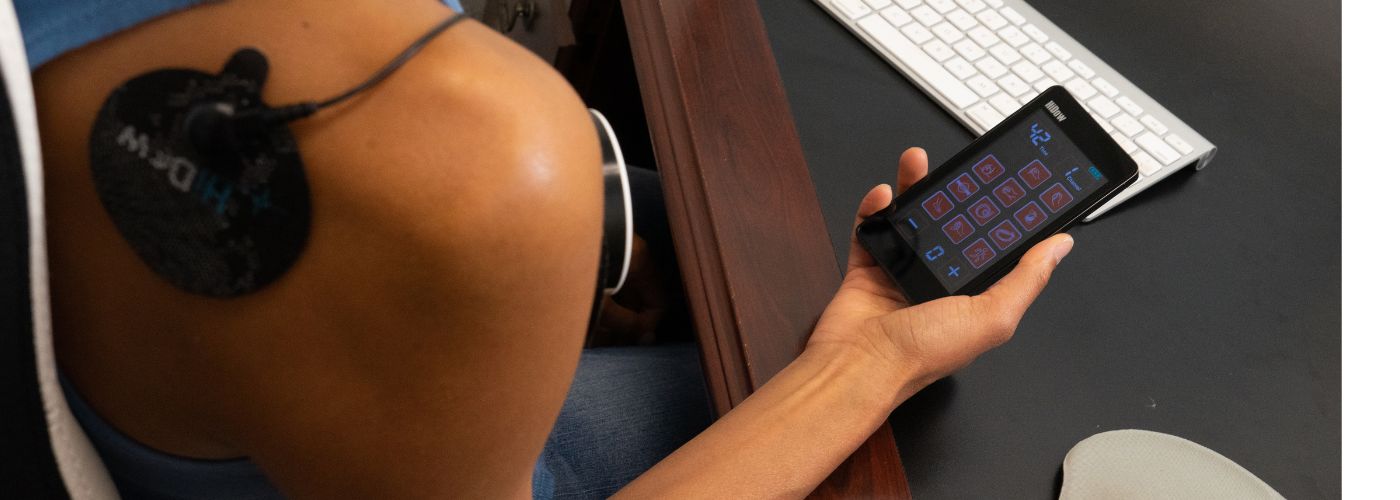In a world where pain management options seem endless, Transcutaneous Electrical Nerve Stimulation TENS therapy often emerges as a beacon of hope for those seeking relief without medications. Yet, despite its growing popularity, TENS is shrouded in myths. We’ll be going over common myths about TENS therapy!
Addressing Common Myths About TENS Therapy
One prevalent myth surrounding TENS (Transcutaneous Electrical Nerve Stimulation) therapy is that it’s merely a glorified massage tool. While the soothing sensation can indeed feel similar, TENS works by sending electrical impulses through the skin to the nerves, potentially altering pain perception is what it’s mainly known for.
Unlike traditional massage, which primarily focuses on muscle tension and relaxation, TENS addresses nerve pathways directly and may provide targeted relief for chronic pain conditions that would otherwise be poorly managed.
Another misconception is that TENS therapy is only effective for acute pain management. However, research suggests that it may also play a significant role in long-term pain relief for conditions such as arthritis and fibromyalgia.
The versatility of TENS machines allows users to tailor settings according to their specific needs—offering both immediate and ongoing support to enhance quality of life.
Is TENS Therapy Only for Chronic Pain Relief?
While TENS therapy is often celebrated for its effectiveness in managing chronic pain, its applications extend far beyond this realm. Many users have discovered that TENS units may enhance athletic performance by promoting muscle recovery and reducing post-exercise soreness.

Athletes are increasingly turning to this low-risk tool not just for relief, but as a means to optimize their training sessions by incorporating electrical stimulation into their recovery routines.
Moreover, TENS therapy offers promising benefits for those facing acute pain from injuries or surgeries. Its potential ability to block pain signals sent to the brain makes it an appealing option for individuals looking to manage discomfort without resorting to medications.
This versatility positions TENS as a valuable adjunct in various therapeutic settings—whether it’s helping someone recover from an injury, alleviating menstrual cramps, or providing comfort during childbirth.
Do You Need a Prescription For TENS Therapy?
Navigating the world of TENS therapy can often lead to confusion regarding prescription requirements. In most places, you do not need a prescription to purchase a TENS unit for personal use.
This accessibility is particularly appealing for individuals seeking relief from chronic pain or muscle discomfort in the comfort of their own home. However, while self-management is empowering, it’s crucial to consider that proper guidance can significantly enhance effectiveness and safety.
Consulting with a healthcare professional before starting TENS therapy is always advisable. They can provide personalized recommendations based on your specific condition and help you understand optimal settings and application techniques.
Additionally, some insurance plans may cover TENS units if they’re prescribed by a doctor, potentially reducing the financial burden associated with this therapeutic solution.
Does Everyone Experience the Same Results with TENS?
When it comes to TENS units, the results can vary dramatically from person to person. A fascinating aspect of TENS is how individual physiology, including skin sensitivity and pain threshold, influences its effectiveness.

For some users, the gentle buzzing sensation translates into significant pain relief almost instantly, while others may barely feel a difference despite using similar settings.
Moreover, psychological factors play a crucial role in how individuals respond to TENS therapy. Expectation and belief in the treatment can amplify its efficacy; known as the placebo effect, it showcases our mind’s power over physical sensations.
Additionally, differences in pain conditions—ranging from chronic back pain to post-operative discomfort—can dictate whether someone experiences profound relief or minimal impact. Understanding these variables encourages a more personalized approach to TENS usage.
Are All TENS Devices The Same?
When exploring TENS devices, it’s crucial to recognize that not all units are created equal. While they may share a common function—managing pain through electrical impulses—the technology, features, and user experience can vary significantly.
Higher-end models often incorporate advanced settings like customizable pulse width and frequency, allowing users to tailor their treatment more precisely compared to basic versions. This customization can be particularly advantageous for individuals with chronic conditions who require nuanced pain management.
Moreover, the design and usability of TENS devices play an essential role in their effectiveness. Some units focus on portability and user-friendly interfaces, catering to those who need relief on-the-go, while others are designed for stationary use with larger pads suited for more comprehensive coverage.
Additionally, smartphone integration is becoming increasingly popular among newer models—a game changer that enables users to monitor their therapy sessions and track progress through apps. Ultimately, understanding these distinctions empowers consumers to choose a TENS device that best aligns with their specific needs and lifestyle.
Is TENS Therapy A Cure?
It’s essential to recognize that TENS is not a “cure” in the conventional sense.
Instead of eliminating the underlying source of discomfort, it serves as a facilitator that may enhance one’s quality of life by providing symptomatic relief. This distinction prompts us to reframe our approach to pain: rather than seeking an elusive cure, we might benefit more from managing symptoms effectively and improving overall well-being.
Moreover, the effectiveness of TENS therapy may vary significantly among individuals due to factors like pain type, duration, and personal physiology. Some users report remarkable reductions in pain intensity within sessions; others may experience minimal effects.

Related Stories
When Courage Takes Flight: Lessons From a Women’s Skydiving Record Attempt
Photo by Taylor Buffington (T-Buff) We went to Eloy, Arizona on a mission — to...
Nov
Sciatica: 1, LeBron: 0 (For Now)
File photo: LeBron James #6 of the Los Angeles Lakers. (Photo: Thearon W. Henderson /...
Oct
Pickleball vs. Tennis: The Science of Recovery
For years, tennis was the stand-in for movement: endurance, coordination, and power all at once....
Oct
5 Ways to Support Bone Strength with HiDow
World Osteoporosis Day (October 20) October 20 is World Osteoporosis Day, and chances are, you’ve...
Oct
FDA-Cleared Is a Flex. Here’s Why.
Pulling Back the Curtain You’ve seen it on boxes, on websites, in ads: FDA-cleared. It...
Sep
This Is Fibro. This Is Larry.
September is Pain Awareness Month. And we’re not here to give you medical definitions or...
Sep